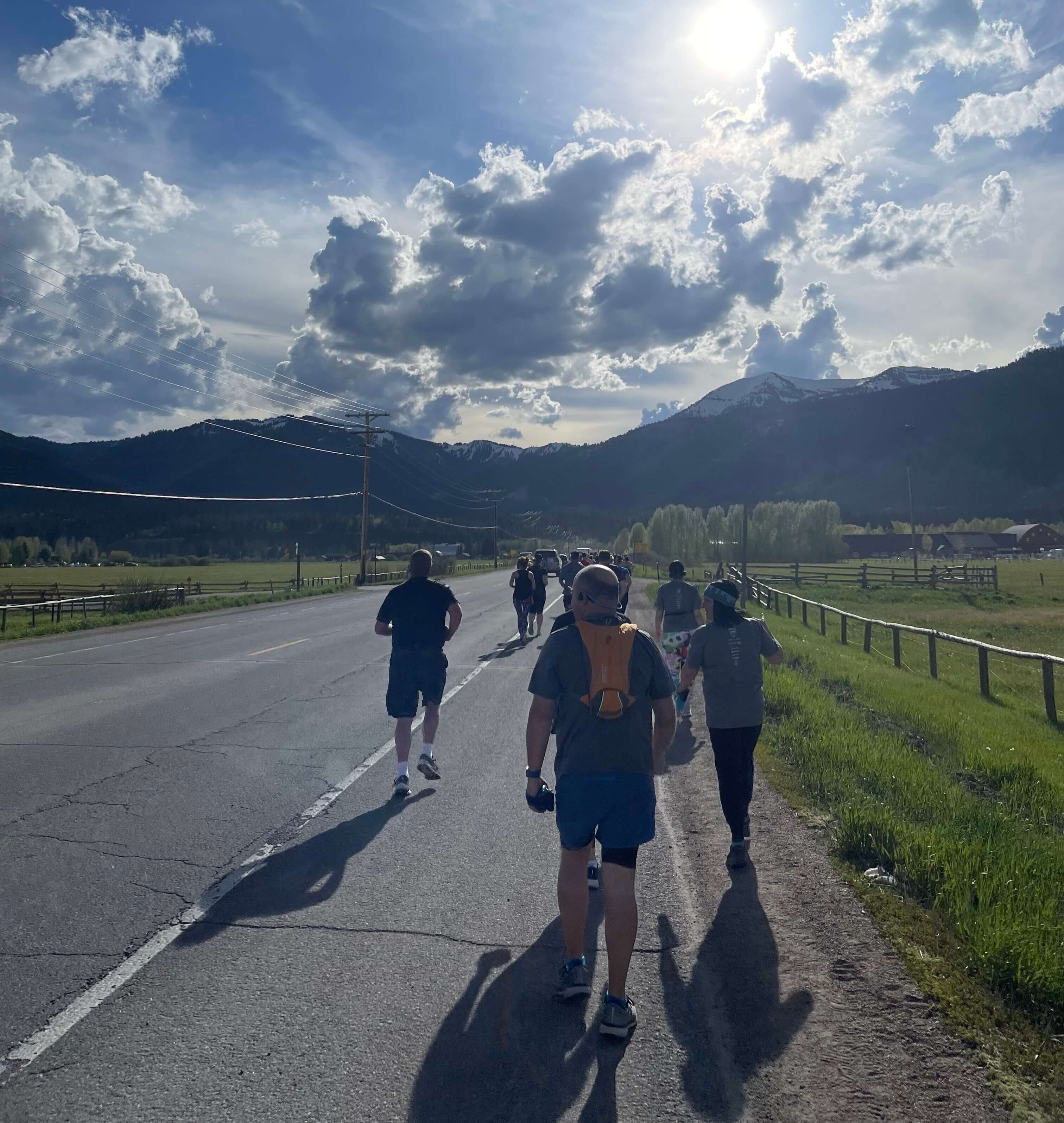How to regulate your nervous system for improved sleep — 11 easy tips
January 29th, 2024 | 6 min. read
By Jen Azevedo

No one can deny how over-scheduled, over-stimulated, and exhausted we are. Busy days at work, caretaking kids (or elder parents), chores, errands, and appointments make us frazzled but tired and in need of a good night's sleep.
How many of us are actually getting the recommended (and uninterrupted) 7-9 hours of sleep?
One of the largest studies about the sleep habits of adults in the US was in 2014 — an era when smartphones did not dominate our lives. In that study, it found that 40% of Americans did not get the recommended seven hours of sleep, and over 40 million people have chronic sleep disorders.
It does not take a scientist to guess that the quantity and quality of our sleep have only gone downhill since then, primarily due to technology.
One of the major obstacles to getting adequate rest is feeling relaxed and calm enough to fall asleep and stay asleep. This problem exists because our nervous systems are overrun with stress, anxiety, and worry.
The Paseo Club is a social club in the Santa Clarita Valley that has supported members in their journeys in health and wellness for over 20 years. We know that sleep is critical to feeling energized. That is why we write this article for you.
In this article, you will learn what your nervous system is, how it affects sleep, and eleven tips you can easily implement to help you sleep restfully every night.
 What is the nervous system?
What is the nervous system?
The autonomic nervous system is the part of the body responsible for regulating your breathing, heart rate, blood pressure, arousal, and digestion.
The nervous system is composed of two parts:
- The sympathetic nervous system is what activates the “fight or flight” response when we perceive a threat. The symptoms you feel — racing heart, sweaty palms, and trembling is the body’s way of expressing that it is in a stressful situation.
- The parasympathetic system kicks in when the brain thinks it’s a good time to recover, helping you calm down and recover.
When you maintain a balance between the sympathetic and parasympathetic systems, your body is better equipped to respond to different stressors. But when the sympathetic system is working overtime from the constant influx of cortisol and adrenaline triggered by stress, you will likely feel tired, irritable, and have trouble sleeping.
11 Tips to regulate your nervous system for better sleep
Stress happens to all of us. Whether it is a fight with your spouse, a tight deadline at work, or a sick loved one — there are a myriad of ways we feel overwhelmed and tense. Below are simple habits that you can try to help calm your nervous system.
.jpg?width=400&height=267&name=pexels-mart-production-7606074%20(1).jpg) 1. Journal
1. Journal
When you are lying in bed late at night while cataloging your to-do list in your mind, grab a notebook to jot down your thoughts. Writing down your tasks or concerns before bed can help you feel prepared and allow your busy brain to rest.
2. Meditate
Meditation is a process of accessing quiet and calm. It often involves breathing slowly and with mindfulness. You can meditate in several ways — walking, sitting, lying down, while chanting, or using visualizations.
Try sitting in a quiet place, closing your eyes, and focusing on your breath. Although you can benefit from meditating for long periods, such as an hour, even ten minutes before bed is helpful.
.jpg?width=350&height=263&name=IMG-3549%20(1).jpg) 3. Exercise
3. Exercise
Science shows that moving your body can help soothe your nervous system and regulate your mood. The great news is that any form of exercise is helpful. Go for a hike, attend yoga class, lift some weights, or have a dance party in your living room — no exercise isn’t supportive of your nervous system.
4. Massage
Many of us would love to schedule a massage with a professional therapist every week, but unfortunately, it is not in our budget.
But that does not mean you cannot receive a massage. Check-in with your partner to see if they will exchange massages before bed. Alternatively, look into the many types of massage tools available and give yourself a massage. (A lacrosse ball works wonders in a pinch!)
Massage lowers cortisol and norepinephrine levels, making it a safe and effective method for relaxing the autonomic nervous system without adverse effects.
5. Grounding
Grounding is the process of spending time in contact (often barefoot) on the earth's surface. Before you discount it as a new-age fad, the National Institute of Health found some interesting facts about grounding.
- Reduces pain
- Improves sleep
- Reduces inflammation
- Regulates cortisol levels
- Expedites the healing of wounds
In a second study by the NIH, they concluded that grounding “regulates correct functioning of the nervous system.”
Try walking barefoot outside, lying down at the beach or in a meadow, gardening with bare hands, or swimming in a natural body of water.
 6. Co-regulation
6. Co-regulation
Humans are inherently social creatures. This was evident during the peak of COVID-19, when the rates of stress, depression, and anxiety skyrocketed worldwide due to social isolation.
Co-regulation is the process of regulating your nervous system with a person — a friend, a partner, or another family member. Co-regulation involves being with someone with a warm, calming presence and a soothing tone of voice — who can listen and empathize with you.
If only your pet is around, confess all your worries to them while petting or holding them in your lap.
7. Cold showers
Cold showers are included on this list not because they are fun but because they work. The blast of cold water releases endorphins into your body and lowers stress, anxiety, and rates of depression.
Some people prefer to cold plunge instead, which is an acceptable alternative. Try it immediately after exercising and a hot shower.
8. Time in nature
Japan has found so much benefit in spending time in nature that they have come up with a cool, catchy phrase to describe it (Forest Bathing) and promote it as a recommended activity by their Ministry of Health.
Most of us spend the majority of our lives inside — offices, work, homes, gyms, etc. Making time to get outside (and off the concrete!) helps your body in many ways.
Yale published an article that found just two hours in nature per week can significantly improve your physical and mental health. It lowers blood pressure and stress hormone levels, enhances immune function, reduces anxiety, and improves moods. Time in nature also contributes to a regulated nervous system and quality sleep.
.jpg?width=367&height=275&name=IMG-6286%20(2).jpg) 9. Sing or laugh (or both!)
9. Sing or laugh (or both!)
You know when your friend makes a joke or tells a story, and it is the funniest thing ever? All that laughing you do in the following minutes regulates your nervous system by stimulating your vagus nerve.
The vagus nerve is the main nerve in your parasympathetic nervous system. When it is activated, it can help you feel relaxed. Sing, laugh, or even gargle to help engage your vagus nerve.
10. Use a weighted blanket
Full body pressure through massage or a weighted blanket calms the nervous system so you can feel relaxed and tranquil. Similarly to how swaddling a baby helps them sleep, the gentle pressure of a weighted blanket may improve sleep for people with insomnia and anxiety.
Look for blankets free of flame-retardants, are the weight you want, and are made from natural materials such as a bamboo cover with glass-weighted beads.
%20(2)%20-%20Edited%20(3).png?width=275&height=342&name=crop_compressed_YogaIMG_9008%20(1)%20(2)%20-%20Edited%20(3).png) 11. Physiological signs or other breathing exercises
11. Physiological signs or other breathing exercises
Stressful thoughts can trigger physical changes like a faster heartbeat, tightened muscles, and sweaty armpits — all of which can lead to negative thoughts. This experience is the exact opposite of what you need at night when you try to sleep.
Breathing is a simple, free, and always accessible tool that you can use to feel better. Some of the most popular breathing exercises are:
Deep breathing: Take a deep inhalation through your nose, retain your breath for a count of five, and then slowly release your breath through your nose.
Box breathing: Breathe in for a count of four, hold your breath for a count of four, exhale for a count of four, and hold your breath again for a count of four.
Pursed lip breathing: Keeping your mouth closed, inhale slowly through your nose for two counts, pucker or purse your lips as though you were going to whistle, and exhale slowly by blowing air through your pursed lips for a count of four.
The physiological sigh is being used by professional athletes and weekend warriors to instantly quell anxiety and feel calm. Take a deep breath through the nose, then a quick, short breath through the nose. Follow it by a long, slow exhalation from your mouth. Do ten physiological sigh breaths before bed to help you have good sleep.
%20-%20Edited%20(1).png?width=375&height=252&name=crop_comp_IMG-2698%20(1)%20-%20Edited%20(1).png) How to regulate at night for great sleep
How to regulate at night for great sleep
During periods of chronic high stress, the body floods with stress hormones like adrenaline and cortisol. It creates wear and tear on the body and mind. Over time it leads to a multitude of health issues, such as chronic pain, anxiety, mood swings, inflammation, and sleep problems.
These tips to regulate your nervous system are safe and easy to do. They are effective on their own but are also great in combination.
- Exercise and then take a cold shower
- Walk in nature and then find a bench for 10 minutes of meditation
- Laugh with a friend, then take turns listening to each other’s worries, co-regulating
In this article, you learned what your nervous system is, how it affects your sleep, and eleven tips to regulate your nervous system so you can get a good night's sleep.
The Paseo Club is a hub for everything you need for your fitness, wellness, and social needs. We offer over 60 fitness classes each week, tennis and pickleball, and swimming. Members relax with a massage or facial at our spa or grab a bite to eat with friends at the cafe. 
If you are looking for a full-service club that can be your home away from home, tour the Paseo Club. Check out all eight acres of our facilities and meet instructors and members.
Jen Azevedo is a tennis professional, pickleball professional, personal trainer, group exercise instructor, and the general manager of the Paseo Club. She loves the community at the Paseo Club and that it is also a safe and fun place for her daughter. Jen’s favorite activities are joining her tribe for trail races or her partners for tennis matches. Occasionally Jen slows down to relax with a book — she reads over 100 a year!
Topics:


